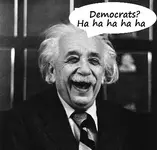JFK
"The final and best means of strengthening demand among consumers and business is to reduce the burden on private income and the deterrents to private initiative which are imposed by our present tax system; and this administration pledged itself last summer to an across-the-board, top-to-bottom cut in personal and corporate income taxes to be enacted and become effective in 1963.
I am not talking about a "quickie" or a temporary tax cut, which would be more appropriate if a recession were imminent. Nor am I talking about giving the economy a mere shot in the arm, to ease some temporary complaint. I am talking about the accumulated evidence of the last 5 years that our present tax system, developed as it was, in good part, during World War II to restrain growth, exerts too heavy a drag on growth in peace time; that it siphons out of the private economy too large a share of personal and business purchasing power; that it reduces the financial incentives for personal effort, investment, and risk-taking.
In short, to increase demand and lift the economy, the Federal Government's most useful role is not to rush into a program of excessive increases in public expenditures, but to expand the incentives and opportunities for private expenditures.
Corporate tax rates must also be cut to increase incentives and the availability of investment capital. The Government has already taken major steps this year to reduce business tax liability and to stimulate the modernization, replacement, and expansion of our productive plant and equipment. We have done this through the 1962 investment tax credit and through the liberalization of depreciation allowances - two essential parts of our first step in tax revision which amounted to a 10 percent reduction in corporate income taxes worth $2.5 billion. Now we need to increase consumer demand to make these measures fully effective - demand which will make more use of existing capacity and thus increase both profits and the incentive to invest. In fact, profits after taxes would be at least 15 percent higher today if we were operating at full employment.
For all these reasons, next year's tax bill should reduce personal as well as corporate income taxes, for those in the lower brackets, who are certain to spend their additional take-home pay, and for those in the middle and upper brackets, who can thereby be encouraged to undertake additional efforts and enabled to invest more capital.
And I am confident that the enactment of the right bill next year will in due course increase our gross national product by several times the amount of taxes actually cut. Profit margins will be improved and both the incentive to invest and the supply of internal funds for investment will be increased. There will be new interest in taking risks, in increasing productivity, in creating new jobs and new products for long-term economic growth."
dang, He was a part of the Tea Party!

 it was meant to be. Right up there with, "I'm not a crook", and, 'Anybody who likes their healthcare can keep it" Sheeeeeesh, folks. The extent to which some of you are completely taken in by these political thugs is mind boggling.
it was meant to be. Right up there with, "I'm not a crook", and, 'Anybody who likes their healthcare can keep it" Sheeeeeesh, folks. The extent to which some of you are completely taken in by these political thugs is mind boggling.

